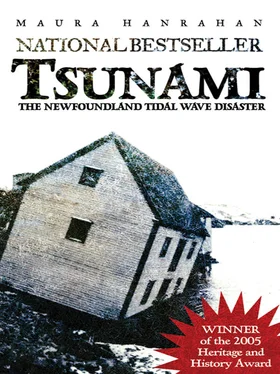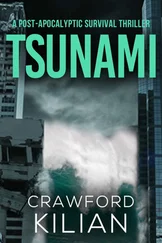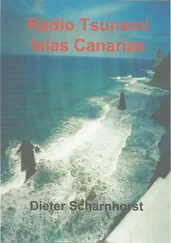The waves weren’t long gone when they began to find the bodies. In Ern Cheeseman’s words, “No human had a chance in such raging roaring seas.” Within two days, the body of eighty-four-yearold Louisa Allen, a native of Oderin, was found tucked under one of the remaining houses. A fisherman in Path End, two miles away, came across the bodies of Jessie Fudge and two of her daughters, Harriet May and little Hannah. That of fifteen-year-old Gertie was still missing. Mary Ann Bennett’s body was discovered under what was left of the government wharf.
As darkness grew thick on the night of November 18, the people of Port au Bras gradually became sure that there would be no more waves. Finally, with midnight close at hand, they crept down the hill and back to the houses that were still left. Their shoulders were slumped and they walked hesitantly, their eyes not leaving the moonlit sea.
The brothers, John and Job Fudge, moved slowly with their arms around each other. As they reached the bottom of the hill, near where their family store and house had so recently stood, they saw a hunched figure sitting on the ground. As they got closer, they heard a low moan. Although they had never heard it before, something in the sound sparked a deep recognition and they strode toward the figure.
“My God, it’s Dad!” John cried, stooping down to look into his father’s haggard face.
“Dad!” Job cried, falling to his knees and hugging his father.
Tom burst into tears and let out loud sobs.
“I saw them in the window!” he cried. “I couldn’t get to them…”
The boys began crying again.
“They just went by on that wave,” Tom continued, gulping air between sobs. “I followed the house. But I couldn’t do anything.”
“Oh Daddy,” Job cried. He crawled into his father’s lap, picturing his mother and sisters desperate for rescue as they were swept out to sea. He knew he would never see them again.
Tom’s brother and his wife, Mary, had caught up to the little group.
“Thank God you’re alive!” Mary said. “We thought you were gone, too.”
“It’s a miracle you weren’t,” her husband said. “Staying on the low ground like that.”
Mary elbowed him in the ribs. “He had to try to get Jessie and the girls,” she said.
Tom began to moan again, but this time he pulled his sons close to him. Their relatives and neighbours stood around them in the cool November night.
“Come home with us, Tom,” Sam Green said.
“Or with us, Tom,” Bridget Hardstone said.
“You’re welcome at our place, too, Tom,” Sarah Hynes said.
“For as long as you like.”
Magistrate Malcolm Hollett was determined to fully document every single case from Mortier Bay in the north to the villages of the boot around to Fortune Bay on the other side of the peninsula. The town of Fortune had survived the tsunami virtually untouched, but forty-three-year-old widower Edgar Hillier had seen his house ripped off its foundation and thrown onto a high rock; in addition, the home’s porch and an annex had been destroyed. Hillier was in poor health, was going blind, and had three children who depended on him.
On the other side of the peninsula in Mortier near Marystown, the waves washed John and Bridget Antle’s house off its foundation. It would have to be taken down and rebuilt… Hollett nearly cracked his pen as he spread the words across the page. Then he glanced at a map; Mortier was just the beginning.
In mid-December Hollett called a meeting of the Rock Harbour-Corbin Committee. He had made several trips down the coast and was fair bursting to talk of what he had seen. Although he was now the agent for the South Coast Disaster Committee, the magistrate wanted to show his closest neighbours that he had not forgotten them.
As snowdrifts piled up outside Hollett’s Burin house, three men walked up the path. Merchant Frank LeFeuvre came from Bull’s Cove. He was followed by Albert Grant of Corbin and Captain William Foote who came from Stepaside.
As the men settled into the parlour and were served tea by Hollett’s quiet little maid, the magistrate read his draft report on the district south of Burin.
The men nodded solemnly and Albert Grant spoke up.
“Make sure you mention that Joshua Mayo’s house is gone,” he offered. “His and Sophia’s. The first wave ripped the house off its foundation and broke away the porch. It tore great holes in the roof, too. Now there’s a big tribe of them homeless.”
Hollett picked up his pen and raised his bushy eyebrows.
“There’s the Mayo children,” Grant continued. “Morgan, Irene, and Daisy, and there’s the four Moulton orphans who live with them, Annie and Tryphena, and the boys, little William and Bert. They lost all their food and Josh’s Hubbard engine is badly damaged, too.”
“Sounds like a very sad case,” Hollett said grimly.
“It is,” Grant nodded. “Those orphans have been through enough already and now this. I believe the family is all split up because there are too many of them to be housed together. It must be hard on those poor children.”
After a minute, Hollett turned his attention to merchant Frank LeFeuvre.
“How did you make out in the tidal wave, Frank? Have you had a chance to assess everything yet?” he asked.
“Well, it was the business that was hurt,” LeFeuvre answered. “Not our home, thanks be to God. But LeFeuvre’s Trading Company took a hit—I’d put the damage at about twenty-one hundred dollars. It’s substantial for us.”
Hollett looked dour. “You’ll need to be back in business for the fishing season,” he said. “The fishermen will need that as much as you do. This brings me to my next topic. There’s been a generous response to our tragedy from all over the country and beyond. We very much need and appreciate all the help we can get. But now Christmas is coming and the New Year will follow. People’s attention will turn from the tidal wave. Besides, human nature being what it is, November 18 will fade from memory soon enough—as good as people are. We have to do something about this.”
He stopped and did a slow turn about the parlour as the men considered his words.
“We still need help,” Albert Grant said. “There’s so much to be done yet.”
Hollett continued. “Yes. So I propose a trip to St. John’s after Christmas to remind the government and the people of the city of our tragedy and the conditions we are still facing. I think that you three gentlemen should accompany me.”
Grant drew back, his eyes wide. LeFeuvre spoke up, “A capital idea, so to speak. A kind of speaking tour of the city.”
“It’s certainly needed,” said Captain Foote. “I don’t know if we’re the right men to go, but you’re on the right track.”
“You might want to bring representatives from farther south, where there’s even worse damage and grief,” Grant said.
Hollett’s face brightened. “Quite right!” he said. “Thank you for your support, gentlemen. We shall agree in principle to the idea and begin planning, then?”
He smiled at their nods.
On January 15, 1930 Magistrate Malcolm Hollett and fisherman Albert Grant sat in the editorial offices of The Daily News on Duckworth Street in St. John’s. Hollett’s heavy-lidded eyes bored into the editors and stenographers as he listed off the devastation that the tidal wave had wrought: thirty-two houses destroyed; twenty-seven others badly damaged; 144 large dories and one hundred small dories wrecked; and twenty-seven trap boats smashed to pieces. The men around the table gasped as Hollett spoke. This was the first time they had heard the numbers in such blunt form.
Читать дальше












